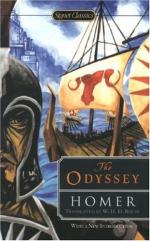“My good friend,” answered Jove, “I should recommend you at the very moment when the people from the city are watching the ship on her way, to turn it into a rock near the land and looking like a ship. This will astonish everybody, and you can then bury their city under the mountain.”
When earth-encircling Neptune heard this he went to Scheria where the Phaeacians live, and stayed there till the ship, which was making rapid way, had got close in. Then he went up to it, turned it into stone, and drove it down with the flat of his hand so as to root it in the ground. After this he went away.
The Phaeacians then began talking among themselves, and one would turn towards his neighbour, saying, “Bless my heart, who is it that can have rooted the ship in the sea just as she was getting into port? We could see the whole of her only a moment ago.”
This was how they talked, but they knew nothing about it; and Alcinous said, “I remember now the old prophecy of my father. He said that Neptune would be angry with us for taking every one so safely over the sea, and would one day wreck a Phaeacian ship as it was returning from an escort, and bury our city under a high mountain. This was what my old father used to say, and now it is all coming true. {117} Now therefore let us all do as I say; in the first place we must leave off giving people escorts when they come here, and in the next let us sacrifice twelve picked bulls to Neptune that he may have mercy upon us, and not bury our city under the high mountain.” When the people heard this they were afraid and got ready the bulls.
Thus did the chiefs and rulers of the Phaeacians pray to king Neptune, standing round his altar; and at the same time {118} Ulysses woke up once more upon his own soil. He had been so long away that he did not know it again; moreover, Jove’s daughter Minerva had made it a foggy day, so that people might not know of his having come, and that she might tell him everything without either his wife or his fellow citizens and friends recognising him {119} until he had taken his revenge upon the wicked suitors. Everything, therefore, seemed quite different to him—the long straight tracks, the harbours, the precipices, and the goodly trees, appeared all changed as he started up and looked upon his native land. So he smote his thighs with the flat of his hands and cried aloud despairingly.
“Alas,” he exclaimed, “among what manner of people am I fallen? Are they savage and uncivilised or hospitable and humane? Where shall I put all this treasure, and which way shall I go? I wish I had staid over there with the Phaeacians; or I could have gone to some other great chief who would have been good to me and given me an escort. As it is I do not know where to put my treasure, and I cannot leave it here for fear somebody else should get hold of it. In good truth the chiefs and rulers of the Phaeacians have not been dealing fairly by me, and have left me in the wrong country; they said they would take me back to Ithaca and they have not done so: may Jove the protector of suppliants chastise them, for he watches over everybody and punishes those who do wrong. Still, I suppose I must count my goods and see if the crew have gone off with any of them.”




